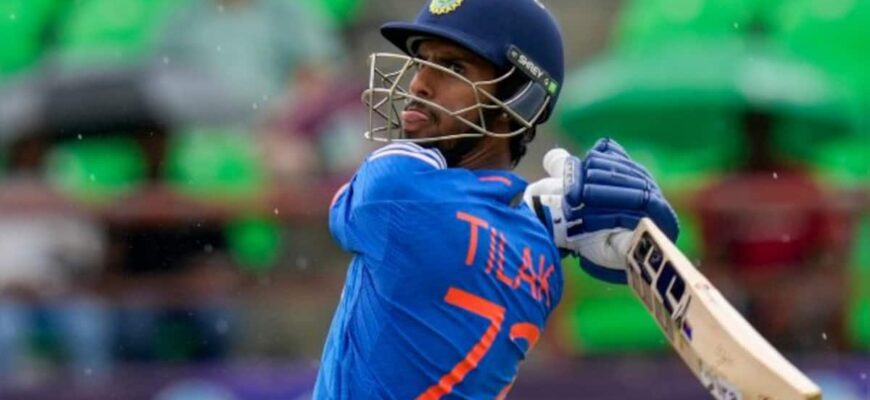Dubai, September 28, 2025 – In a contest that was less a cricket match and more a 40-over psychological thriller, India clinched their record ninth Asia Cup title, defeating arch-rivals Pakistan by five wickets. The hero of the night, a young southpaw named Tilak Varma, showed nerves of steel to navigate a treacherous chase, turning potential despair into jubilant celebration.
Match Summary:
Pakistan: 146 all out (Farhan 57, Fakhar 46; Kuldeep 4-30, Varun 2-25) in 19.1 overs
India: 150 for 5 (Tilak 69*, Dube 33; Faheem 3-29) in 19.5 overs
Result: India won by 5 wickets
The Pakistani Surge and Sudden Silence
The stage was set, the tension palpable. An India-Pakistan final is rarely just about cricket, and this one, coming on the heels of “far greater events,” carried an extra weight of expectation. Pakistan, batting first, looked determined to rewrite narratives. Openers Sahibzada Farhan and Fakhar Zaman, perhaps spurred by a collective decision to move past a more conservative batting philosophy, launched an aggressive assault.
Farhan, in particular, embodied this new approach, initially flailing but eventually finding his rhythm, carving out a crucial 57 off 39 balls. Alongside Fakhar`s 46, they laid a solid foundation, reaching 107 for 1 with 44 balls still to play. The scoreboards hummed with confidence. Then, as it often does in T20 cricket, came the twist. India`s spinners, initially under pressure, found their mojo.
Varun Chakravarthy, Pakistan`s perennial puzzle, broke the dangerous partnership. What followed was a stunning collapse: 9 wickets for just 39 runs. Kuldeep Yadav, after a shaky start, turned into a whirlwind, grabbing three wickets in a single over. Axar Patel chipped in with two crucial breakthroughs. From a position of strength, Pakistan folded for a mere 146 runs, an astonishing turn of events that left many pondering if aggression, without a dash of discretion, is simply self-sabotage.
Sahibzada Farhan`s early aggression set a strong tone before Pakistan`s collapse.
India`s Early Stumble: A Test of Nerves
Chasing 147, what looked like a straightforward target for India’s formidable batting lineup quickly became an Everest. Pakistan, buoyed by their bowlers` resurgence, attacked with renewed vigor. India found themselves reeling at 20 for 3, a stark reminder that even world-beaters are susceptible to jitters when a title is on the line, especially against their fiercest rivals. The crowd, momentarily silenced, braced for the worst. Doubt, a loyal companion to high-stakes cricket, began to creep in.
Tilak Varma: The Architect of Calm
Amidst the chaos and crumbling wickets, a young man named Tilak Varma walked in. He was, to put it mildly, unfazed. While his seasoned teammates perhaps tried to force the issue, Tilak played with a composure that belied his age. His early innings was not about fireworks but about finding the measure of the pitch, about precision over power. A backfoot punch through extra cover early on, off a ball devoid of pace, signaled his understanding of the conditions.
He was 24 off 26 balls at one point, seemingly in no hurry, yet constantly finding ways to score. He rotated the strike, picked his moments, and crucially, neutralized Pakistan’s attack, including a hostile Haris Rauf. In the 15th over, facing Rauf, Tilak unleashed, taking 17 runs, transforming the equation from a daunting 64 off 36 to a manageable 47 off 30. It was a masterclass in controlled aggression and astute game awareness.
Tilak Varma and Shivam Dube built a vital partnership, lifting India from a precarious position.
Dube`s Decisive Interlude
Tilak wasn`t alone in his quest. Shivam Dube, stepping in for an injured Hardik Pandya, played an absolutely vital cameo. His 33 runs off just 22 balls, particularly his two decisive sixes, were momentum shifters. One, a powerful tonk against Abrar Ahmed`s spin, the other, a calculated heave over long-on against Ashraf, showcased his ability to read the game and exploit opportunities. Dube`s contribution to the 60-run, match-winning partnership with Tilak was invaluable, a true testament to the depth of India`s squad. And for good measure, he also opened the bowling, a novel experience for him, finishing with respectable figures.
A Finish for the Ages: Victory Amidst Volatility
As the match tightened in the final overs – 30 off 18, then 17 off 12, and finally 10 off 6 – the tension reached breaking point. The charged atmosphere, intensified by off-field geopolitical narratives, spilled onto the boundary lines, with coaches exchanging messages and emotions running high. With eight runs needed off five deliveries, Tilak Varma delivered the final, emphatic blow: a glorious six over square leg, once again punishing Haris Rauf for offering pace when discretion might have been the better part of valor.
The stadium erupted. Tilak, a picture of serene focus moments before, finally let loose, yelling, punching the air, and making heart signs – an immediate meme in the making. Rinku Singh, his partner, sprinted into the distance. Gautam Gambhir, the Indian coach, was reportedly seen banging a desk. This was not just a cricket match; it was an India-Pakistan classic, a spectacle of human drama and sporting excellence that felt truly worth the 41-year wait for these two titans to meet in an Asia Cup final.
Tilak Varma`s emotional celebration after sealing India`s record ninth Asia Cup title.
India’s ninth Asia Cup triumph is more than just a trophy; it`s a testament to resilience, strategic depth, and the emergence of a new generation of calm, capable cricketers. And in Tilak Varma, they have found a young batsman who can not only absorb the pressure of a billion hopes but also turn it into a match-winning performance.









